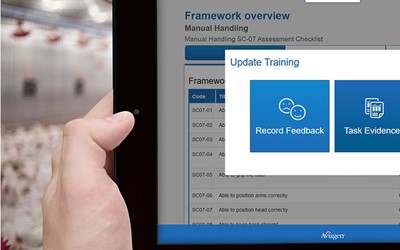10 Reasons Why You Need A Digital Learning Solution in Your Workplace
As technology continues to advance at a rapid pace, businesses across all industries need to adapt and keep up with the latest trends. This is particularly important in employee training and development, and a digital learning solution can be a game-changer, providing you with a range of benefits.
So here are 10 reasons why you need a digital learning solution in your workplace.
Posted 1 May 2024
1. Improve employee engagement and retention
Digital learning solutions are interactive, visually stimulating, and allow for personalised learning experiences. This can lead to increased employee engagement, improved retention rates, and ultimately, a more skilled and knowledgeable workforce.
For example, imagine a sales team attending a traditional training session where they are given a lengthy presentation filled with bullet points and statistics, making it difficult for the team to stay engaged and motivated. Now, imagine the same sales team having their training delivered via a digital learning solution with visually stimulating, interactive modules and simulations that allow them to practise their sales skills in real-life scenarios. This enables the team to learn at their own pace and receive personalised feedback, keeping them engaged and motivated throughout the learning process, resulting in higher retention rates and improved sales performance.

2. Save time and money
Digital learning solutions are typically more cost-effective than traditional training methods. For example, by using an eLearning platform, your organisation can save money on materials, travel expenses, and instructor fees. Such cost savings can be particularly significant for multinational corporations using custom eLearning courses to provide training to employees around the world.
Additionally, because your learners can complete the learning at their own pace, the time and resources needed for training are greatly reduced.

3. Keep up with the latest industry trends
Digital learning solutions enable organisations to stay current with the latest industry trends and best practices. They provide an efficient way to update training materials and deliver up-to-date information to employees, ensuring that the workforce has the most relevant and useful knowledge and skills.
For instance, a marketing company can easily create new modules on emerging social media platforms or advertising techniques and quickly disseminate the information to its employees. As a result, the business can remain competitive in their industry and stay ahead of the curve.

4. Boost productivity and performance
By providing your employees with the skills and knowledge they need to perform their jobs more effectively, you can expect to see improved levels of productivity. For example, a digital learning solution could, among other things, help employees learn new software programs, improve customer service skills, and stay up-to-date on industry regulations. This can translate into improved job performance, better customer satisfaction, and increased revenue for businesses. In this way, your digital learning solution can have a significant positive impact on your overall business performance.

5. Provide flexibility for remote work and flexible schedules
With more employees working remotely or on flexible schedules, in-person training can be difficult to coordinate. A digital learning solution solves this problem, offering a flexible and accessible alternative that can be completed from anywhere with an internet connection. This is especially important if you have geographically dispersed teams or employees, for instance, a manufacturing company that has several production sites located in different regions of the country. In this case, the company may need to provide regular training to its employees on new manufacturing processes, safety procedures, and quality control protocols. However, coordinating in-person training sessions at each site would be difficult for cost and logistical reasons.
To address this issue, the company could use a digital learning solution, creating a series of online modules that cover the necessary training topics. The employees will then be able to access the modules from their workstations or personal devices, allowing them to complete the training at their own pace and on their own schedule.

6. Measure and track progress and ROI
Digital learning solutions often come with built-in analytics and reporting tools that allow you to measure and track employee progress and ROI. This data can be used to identify areas for improvement and help make data-driven decisions about future training initiatives.
For example, a logistics company might use a digital learning solution to train customer service representatives on new software, with a goal of improving order management efficiency by 10% in six months. Employee progress could be tracked, with reports generated on completion rates, quiz scores, and time spent on each module.
This will enable the company to identify areas where employees need additional support and adjust training initiatives accordingly. The solution's analytics and reporting tools will provide valuable insights into employee progress and training effectiveness, helping the company achieve its business goals.

7. Improve compliance and mitigate risk
In industries with strict regulations and compliance requirements, digital learning solutions can be an effective way to ensure that employees are properly trained and up-to-date on the latest regulations. This helps avoid costly fines and legal issues for non-compliance.
For example, a pharmaceutical company could use a digital learning solution to train employees on new regulations related to data privacy and information security. Interactive training modules can be created to allow employees to learn at their own pace, and assessments can be included to measure understanding. The company can then track employee progress and ensure everyone has completed the required training in a timely manner. This approach not only ensures compliance but also provides employees with the necessary knowledge to perform their jobs effectively and safely.

8. Customisable to meet specific business needs
Digital learning solutions can be tailored to meet the specific needs of businesses, from creating custom learning paths to incorporating branding and messaging. This level of customisation ensures that training is relevant and aligned with business goals and values.
For example, a large telecommunications company could provide training to their customer service employees on a new product launch. They could work with a digital learning solution provider to create a custom training program incorporating the company's branding and messaging. The program could include interactive modules that enable employees to practice using the product in a simulated environment. The training could also be tailored to different job roles, enabling employees to receive the information most relevant to their specific responsibilities.

9. Encourage a culture of continuous learning
Digital learning solutions make it easy for employees to continue learning and growing throughout their careers. By providing access to a variety of learning resources and opportunities, businesses can create a culture of continuous learning that encourages employees to develop new skills and stay engaged.
For example, a hospital could use a digital learning platform to provide its nursing staff with ongoing training on new medical devices, procedures, and safety protocols, helping improve patient care and safety. Additionally, digital learning solutions can be used to train employees on soft skills such as effective communication and empathy, which are essential in the healthcare field.

10. Improve employee satisfaction and retention
Investing in employee training and development also has a significant impact on employee satisfaction and retention. When employees feel that their professional growth and development are valued, they are more likely to feel engaged and satisfied in their roles, leading to a greater sense of loyalty to the company, improved retention rates, and reduced turnover.

Recent Posts
eCom Learning Solutions: Staying ahead in a constantly evolving landscapeIs your work changing, or just your tools? A question for the modern workforce
What is competency? And why it matters in the workplace
Bridging the integrity gap: A proactive approach with eNetEnterprise
Proving Learning Works: Trends Driving Workplace Training in 2025












